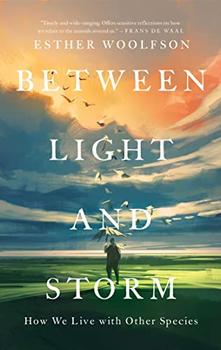Summary | Excerpt | Reviews | Beyond the Book | Read-Alikes | Genres & Themes | Author Bio

How We Live with Other Species
by Esther WoolfsonThis article relates to Between Light and Storm
 In Between Light and Storm, Esther Woolfson critiques the idea that humans have a unique moral status that grants us the right to exploit animals for our own purposes without regard to their interests and welfare. This belief system, founded on the notion of human exceptionalism, is often referred to as "speciesism," a term coined by English philosopher and psychologist Richard Ryder in an influential 1970 leaflet arguing against the use of animals in research experiments and popularized and expanded upon by Australian philosopher Peter Singer in his 1975 book Animal Liberation.
In Between Light and Storm, Esther Woolfson critiques the idea that humans have a unique moral status that grants us the right to exploit animals for our own purposes without regard to their interests and welfare. This belief system, founded on the notion of human exceptionalism, is often referred to as "speciesism," a term coined by English philosopher and psychologist Richard Ryder in an influential 1970 leaflet arguing against the use of animals in research experiments and popularized and expanded upon by Australian philosopher Peter Singer in his 1975 book Animal Liberation.
"Since Darwin, scientists have agreed that there is no 'magical' essential difference between human and other animals, biologically speaking," Ryder wrote, arguing that speciesism is a form of discrimination akin to racism or sexism. "Why then do we make an almost total distinction morally? If all organisms are on one physical continuum, then we should also be on the same moral continuum."
Arguments for speciesism are typically based on the idea that moral standing depends on some crucial feature or capacity that only humans are alleged to enjoy, such as reason, self-awareness or sentience. Since animals lack this distinctively human capacity, according to this reasoning, we are justified in excluding them from moral consideration and acting without regard to their interests and welfare.
Critics of speciesism, however, argue that none of the characteristics that could plausibly matter from a moral point of view can be shown uncontroversially to apply to only and all humans. For example, non-human animals, like humans, are sentient beings with the capacity to feel pain, fear, suffering and happiness—despite 17th-century French philosopher René Descartes' attempts to argue otherwise. Yet appealing to a stricter criterion that might exclude animals, such as tying moral status to the capacity for rationality or self-reflection, would also exclude some humans from consideration, for example, infants and people in comas.
While the term speciesism came into prominence in the 1970s, critiques of the concept are much older. Ancient dissenters included Pythagoras in the sixth century BCE, Plutarch in the first century CE and the third-century CE neoplatonist thinker Porphyry, all of whom rejected the idea that humans have no moral duties toward animals, arguing that it is our obligation to treat them with compassion and to avoid inflicting unnecessary suffering on them. Many later thinkers also echoed this view, ranging from the great Jewish philosopher and scholar Maimonides in the 12th century to French Enlightenment thinkers Voltaire and Rousseau and 18th-century English philosopher Jeremy Bentham, who argued that the capacity to suffer and feel pain—shared by animals—is the only relevant moral criterion, famously writing, "The question is not, Can they reason? nor Can they talk?, but Can they suffer?"
Linking disregard for the welfare of animals to a broader failure to consider the destructive effects of our actions on the environment, Woolfson bemoans the fact that the dominant voices shaping Western attitudes toward the natural world have not been those urging compassion and respect for other species but those encouraging the greatest license and cruelty. "Why were the texts that engender a view of the desirability of a hierarchical, exploitative relationship between humans and animals the ones to gain ascendancy?" she laments. "Why was there so little attention paid in Western thinking to the more questioning and humane voices?"
Pythagoras, ancient Greek philosopher. From The history of philosophy by Thomas Stanley (circa 1655)
Filed under Nature and the Environment
![]() This article relates to Between Light and Storm.
It first ran in the February 1, 2023
issue of BookBrowse Recommends.
This article relates to Between Light and Storm.
It first ran in the February 1, 2023
issue of BookBrowse Recommends.
Your guide toexceptional books
BookBrowse seeks out and recommends the best in contemporary fiction and nonfiction—books that not only engage and entertain but also deepen our understanding of ourselves and the world around us.